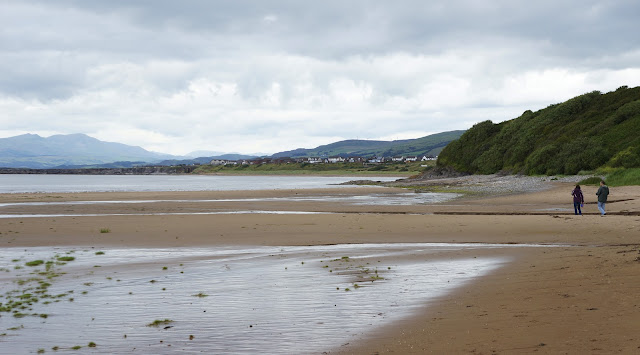Last night I was idly doodling with pen on paper when I suddenly remembered reading something on am's blog,
Talking 37th Dream (Rumors Of Peace), several years ago. She remarked on the fact that the words 'Earth' and 'Heart' were anagrams of each other. I decided to pursue this pleasing coincidence. (Or is it a coincidence?) First of all I drew the following word square...
... and then I filled in the central vertical and horizontal lines of the word square with the word 'Rumba'. The rumba is, of course, a Cuban dance. But its roots are in Africa, which is our human heartland, since the first homo sapiens developed on Africa's earth...
After that it seemed natural and obvious to complete the remaining verticals and horizontals with the words 'Aquae' and 'Tabor'. The tabor is an early European portable snare drum played with a stick in one hand. It's the hallmark of an improvisatory one man band, often heard in a pipe-and-tabor combination, but also used widely in massed bands. So here we have a potent symbol for music, the very heart and soul of individual and communal spiritual and earthly life...
'Aquae' is the plural of the Latin 'Aqua' or 'Water', and water comprises 70% of the earth's surface and 60% or more of the adult human body (incredibly, the brain is nearly 80% water). Water is essential for life and is basic to our very existence. Indeed, the first simple forms of life originated from hydrothermal vents deep in the oceans. It also has magical, mystical and healing properties. You could say that water lies at the heart of our very presence on this earth...
There is more. In my drawing the word square lies within a circle and touches this circle at four equidistant points.
The circle is a symbol for the universal, the cosmic, the sacred and the divine. It's the shape of the earth, of the stars, and of all the planets and their orbits. It symbolises inclusivity and completeness. It's the form of the yin yang symbol. And it represents the circularity of time and the seasons, the unchanging cycle of life, death and rebirth.
The square has four sides and four right-angled points, and symbolises stability, groundedness — rooted-on-earthliness. The number four is a mystical and spiritually significant number. There are four seasons, four elements, four geographical directions, four mathematical processes (addition, subtraction, multiplication, division). There are four Christian Gospels, four Evangelists, four horsemen of the Apocalypse, four Noble Truths of Buddhism. There are four Humours (blood, yellow bile, black bile, phlegm), four Temperaments (sanguine, choleric, melancholic, phlegmatic), four Cardinal Virtues (justice, prudence, temperance, fortitude) and four suits in a pack of playing cards (clubs, diamonds, hearts, spades).
In Chinese symbology a square within a circle represents the union of heaven and earth, and in Jungian psychology it represents the complementary balance of body and psyche.
Leonardo's sketch,
Vitruvian Man, shows a man within a circle within a square; this creates an analogy between the harmonious workings of the human body and the harmonious workings of the universe, ie it illustrates the microcosm within the macrocosm, the macrocosm within the microcosm.
And there is more. Let's look at numerology. The words 'Earth' and 'Heart' which enclose the word square (and are the only words touching the circumference of the surrounding circle) can be analysed numerically in this way. If 'A' equals '1', 'B' equals '2' and 'C' equals '3' etc, the word 'Earth' becomes 5, 1, 18, 20, and 8, which adds up to 52; and the word 'Heart' becomes 8, 5, 1, 18 and 20, which adds up, of course, to 52 again. Does the number '52' ring a bell? Yes, that's right — it's the total number of cards in a pack of playing cards. You know, those playing cards which have four suits, with one of those suits being hearts. And we have four words here too — two 'Earths' and two 'Hearts' — so that's four packs of playing cards!
To sum up: I believe earth and heart, both anagrams of each other, have a symbiotic and mystical relationship. The earth was the heart of the universe in pre-Copernican times. And the earth remains at the heart of our mortal existence. Water, or aqua, is our lifeblood, the source, the stream, the well, the substrate, the fountainhead. Music, represented by the tabor (its rhythm percussive as a heartbeat), can also be seen as central to our well-being, giving pleasure, meaning and depth to our lives. And the rumba is a dance from the heart of Africa, whose earth can be considered the origin and heart of human life.
Note finally that the word 'Rumba' forms a cross in the centre of the word square, and a cross, whether Christian or otherwise, has four sections and four points. And the letter 'M', at the very centre of the square, is one of the two letters ('M' and 'N') which lie exactly midway through the alphabet.
I danced in the morning when the world was begun / I danced in the Moon and the Stars and the Sun / I came down from Heaven and I danced on Earth / At Bethlehem I had my birth. SYDNEY CARTER Lord Of The Dance
We should consider every day lost on which we have not danced at least once. FRIEDRICH NIETZSCHE
Dance is the hidden language of the soul. MARTHA GRAHAM















